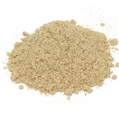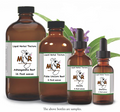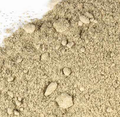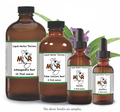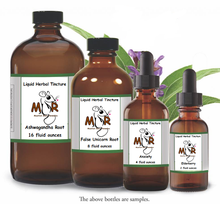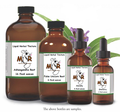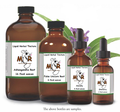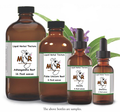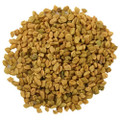 Loading... Please wait...
Loading... Please wait...- Home
- Herbal Tinctures
- Herbal Tinctures - Single Herbs
- Fenugreek Seed Tincture
Fenugreek Seed Tincture
Product Description
Fenugreek Seed Tincture
Overview - Fernugreek in appearance, fenugreek looks very similar to alfalfa, but with a yellow or white flower. Historically it was used to scent inferior hay to make it appear more appetizing to the livestock. It is thought to have originated in the Mediterranean area and the Middle East. The plant grows about two feet tall. The ancient Greeks, Egyptians and Romans all used it for medicinal and culinary uses.
Medicinal Uses - Internally, fenugreek is taken as an herbal tea to reduce fever and menstrual pains. It can also be used to increase the milk supply of nursing mothers. It has also been used as a digestive aid and it also contains compounds that make it an excellent expectorant to use for lung and sinus congestion. Externally, fenugreek seeds are soaked then powdered for use in lip balm and tonic. It can be very effective as a poultice for abscesses, carbuncles, and boils.
The seeds contain alkaloids (mainly trigonelline) and protein high in lysine (Lysine is an essential amino acid needed for growth and to help maintain nitrogen balance in the body.) and L-tryptophan. Its steroidal saponins are thought to inhibit cholesterol absorption and synthesis. Trials have shown that fenugreek lowers elevated cholesterol and triglyceride levels in the blood, but does not lower HDL (“good”) cholesterol levels. The typical range of intake for cholesterol-lowering is 5–30 grams with each meal or 15–90 grams all at once with one meal. As a tincture, 3–4 ml of fenugreek can be taken up to three times per day. Due to the potential uterine stimulating properties of fenugreek, which may cause miscarriages, fenugreek should not be used during pregnancy.The risk: Increases the risk of bleeding associated with warfarin.
Other Uses – Fenugreek seeds are ground and roasted to flavor curry mixtures. The leaves may be added to salads for extra iron in the diet. The seeds are said to be an aphrodisiac and to increase the libido. Seeds are also used to flavor the feed of cattle, as well as adding a maple flavor to confections and pastries. Nutritionally it is a great source of thiamine, iron, silicon, sodium and selenium.
Parts Used - Seeds are the most commonly used part of the plant, although the leaves can be eaten as well.
Precautions - Use fenugreek with caution if you are allergic to either chickpeas or peanuts. This herb is in the same plant family, and if you are sensitive to one of these, you might also be sensitive to fenugreek.
- It has been shown to lower blood sugar levels and cholesterol. If you are diabetic, however you should use with caution. Unless your blood sugar levels are under control, you may find your levels at a dangerously low level without warning. Always monitor your sugar levels carefully when taking this herb.
- Do not take during pregnancy, as it is a known emmenagogue and may cause miscarriage.
- Be very cautious if you suffer from asthma, migraines or blood pressure issues. While fenugreek is reputed to help with these ailments, other studies have shown it to worsen them.
- Because Fenugreek may interfere with the absorption of iron, people with anemia should avoid its use.
- Pregnant women should absolutely not use this herb, as it may stimulate uterine contractions, and it is advisable for nursing mothers to consult their physicians before use. There may be a maple syrup smell in your sweat or urine, and in infants exposed to Fenugreek through breast milk, you may notice a maple syrup odor in their urine.
- Fenugreek may also alter the balance of various forms of thyroid hormones and should not be used by those taking thyroid hormone medication. Large doses (many times the recommended amounts) are not recommended, as it may cause nausea, diarrhea and gas.
- Diabetics should always consult a physician before using Fenugreek.
- Do not take Fenugreek without talking to your doctor first if you are taking blood thinning medicine (examples: warfarin, aspirin, enoxaparin, etc.) or medicine for diabetes (examples: metformin, glyburide, insulin, etc.).
- Do not take Fenugreek at the same time as other medications; separate administration by an hour or two.
Suggested - Use 6-15 drops in juice or water, under the tongue or as desired. May be taken 3 times daily. Shake well. Store in cool dark place. Keep out of reach of children.
Disclaimer - The information presented herein by Mountain Maus’ Remedies is intended for educational purposes only. These statements have not been evaluated by the FDA and are not intended to diagnose, cure, treat or prevent disease. Individual results may vary, and before using any supplements, it is always advisable to consult with your own health care provider.
Find Similar Products by Category

Product Reviews
-
I like it

Posted by Unknown on 28th Dec 2018
Finally got around to trying fenugreek seed. I'm very impressed. I have long read its use for congestion (e.g., respiratory mucus and sinus congestion), which seems logical that one popularized use is for helping lower bad cholesterol (but I haven't verified for myself). It seems to be working better than other products and herbs I've tried (long list) for my respiratory and sinus issues. The taste is pleasantly mellow. And it doesn't seem to have any sedative effects, which is great for day time use.


